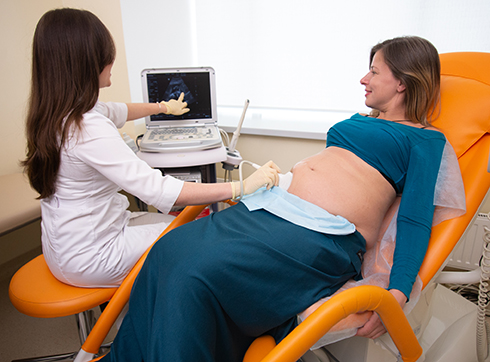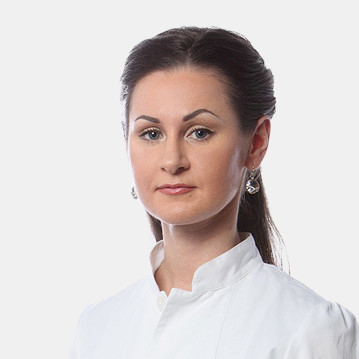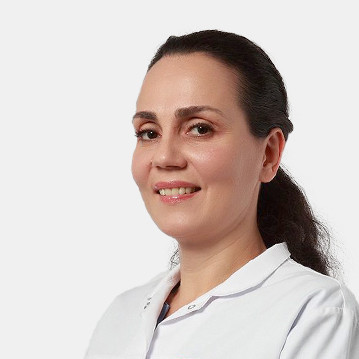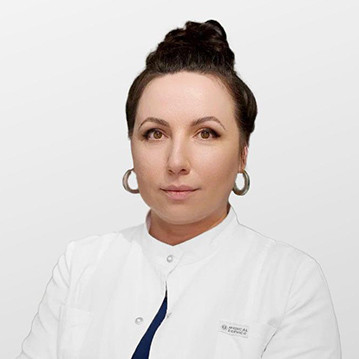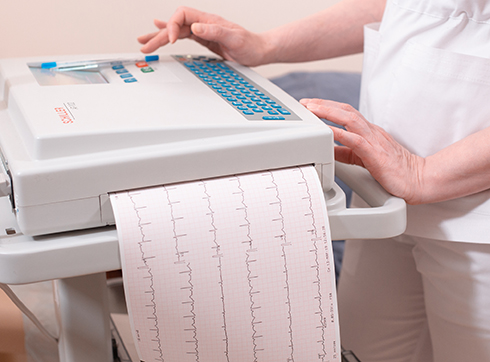
Transvaginal ultrasound
This medical examination is carried out using a special high-frequency probe inserted into the vagina. During the procedure, the doctor receives accurate data on the state of the internal organs and sees an image with a high degree of detail.
Transabdominal ultrasound
For gynecological abdominal (or transabdominal) ultrasound, another probe is used, designed for ultrasound examination through the anterior abdominal wall with a full bladder. The method allows you to determine the topography of organs and recognize their possible pathology.
Transrectal ultrasound
For transrectal ultrasound, a probe with a condom on it is inserted into the patient's rectum. This method of research is used for objective reasons: infection or severe narrowing of the entrance to the vagina, vagina, virginity, etc.
Indications
To find out when is the best time to do a gynecological ultrasound, you should familiarize yourself with the list of diseases detected by ultrasound. These diseases include:
- menstrual disorders;
- ovarian cysts and tumors;
- uterine tumors;
- congenital abnormalities in the structure and structure of the genital organs;
- inflammatory processes;
- uterine bleeding;
- suspected ectopic pregnancy;
- endometriosis.
Usually, ultrasound of the pelvic organs is performed on the 4th-6th day of the cycle, and if the cycle is irregular - on the 2nd-3rd day.
Ultrasound diagnosis of the ovaries is prescribed to determine their functional activity. The structure of the ovaries changes depending on the stage of the monthly cycle. Ultrasound makes it possible to understand how fully the ovaries function in a woman.
The study is carried out several times during one cycle:
- day 8-9;
- day 14-15;
- day 22-23.
Gynecological ultrasound of the small pelvis is also performed to diagnose an "acute abdomen", identify the causes of infertility, determine pregnancy and its duration, monitor recovery after surgical interventions, and preventive planned examinations.
Ultrasound for pregnant women
After pregnancy is detected, a woman undergoes a transvaginal ultrasound examination for a period not later than 12 weeks to exclude inflammatory processes, as well as in case of injuries and intoxications. At a later date (in the 2nd and 3rd trimesters), a gynecological transabdominal ultrasound is performed to determine:
- variants of presentation and correct development of the fetus;
- multiple pregnancy;
- state of amniotic fluid;
- pathologies of the placenta;
- preeclampsia;
- polyhydramnios.
Pregnant women also need an ultrasound examination in case of diabetes mellitus, overpregnancy, and in the presence of other diseases and abnormalities.
Contraindications
Neither transvaginal nor transabdominal ultrasound have clearly defined contraindications. The only exceptions are gynecological operations, after which a transvaginal examination is not recommended due to the risk of physical damage. However, for gynecological pelvic ultrasound, there are some time limits. For example, ultrasound diagnostics is not recommended later than 5-6 days from the start of the menstrual cycle. This is due to the natural thickening and growth of the endometrium, which complicates the diagnosis and hides possible pathologies (behind the overgrown endometrium, the doctor may not see small neoplasms and entrances to the fallopian tubes) .
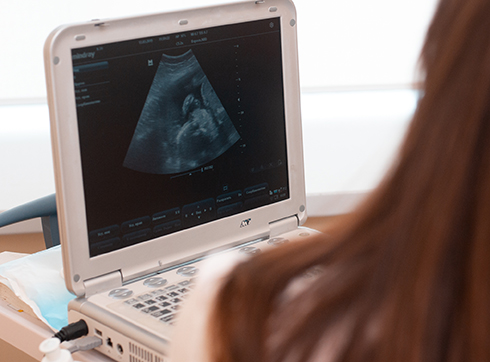
Preparation
Preparation for gynecological ultrasound is necessary for both transvaginal and transabdominal examinations. After all, the quality of the results will depend on the condition of your intestines. During the procedure, it must be empty and without gases. Therefore, you must do the preparatory work 2-3 days before visiting the doctor. This work includes a proper diet and taking drugs that eliminate constipation and gas formation.
During preparation, you should exclude from the diet:
- black bread;
- raw vegetables;
- milk;
- fruits;
- confectionery.
The listed products can cause flatulence and constipation, so they should not be consumed before an ultrasound. You can also take activated charcoal, dill water, and bowel cleansers and stimulants (as recommended by your doctor).
Many patients do not know whether it is possible to eat before a gynecological ultrasound or not? Water is needed only for transabdominal examination, as it is carried out under the condition of a full bladder. Therefore, before the procedure (1 hour before), you must drink 1 liter of water and do not urinate. This rule does not apply to pregnant women in the 2nd and 3rd trimesters. They do not need water to get reliable results.
If an emergency ultrasound is necessary, no preparatory work is carried out, however, the result may be less accurate than with a routine examination.
Method of the procedure
In order not to worry about undergoing an examination unknown to you, you should know how a pelvic ultrasound is done in women. After all, this is an absolutely painless procedure that requires you only to relax and follow the recommendations of the doctor.
To start it, you must lie on the couch, expose your stomach and bend your legs slightly (in the case of a transvaginal ultrasound, the examination can be performed directly in the gynecological chair). If the doctor has prescribed an abdominal examination technique, he will apply the gel to the surface of your abdomen and begin to drive along it with a probe connected to modern ultrasound equipment. Thus, the organs of the abdominal cavity and small pelvis are examined. If a transvaginal procedure is recommended for you, then a special transducer designed to be examined through the vagina will be used. A condom is put on this sensor, after which a medical gel is applied to it.
Treatment duration
Ultrasound of the female reproductive system can be performed within 10-30 minutes. The time of the procedure depends on the purpose of the study and the severity of the disease.
Transcript of results
After a pelvic ultrasound in women, the decoding of the main results includes:
- The dimensions of the uterus. They can be individual for each woman and are approximately 5 cm long, 5.4 cm wide and 3.5 cm thick. However, these indications are typical for patients of childbearing age. In older women (20 years after menopause), these measurements will be 4.2 cm long, 4.4 cm wide, 3 cm thick.
- The structure of the uterus. Normally, it should be homogeneous.
- The contours of the uterus - the clarity of their outlines indicates the absence of pathologies.
- The thickness and structure of the endometrium, referred to as M-echo, and dependent on the patient's menstrual cycle.
- The size of the ovaries, their location relative to the uterus, the size of the corpus luteum, as well as the size of the follicles relative to the phase of the menstrual cycle. Normally, in a woman of childbearing age, the dimensions of the ovaries are 3.6 cm long, 1.9 cm wide and 2.6 cm thick.
If necessary, the doctor may prescribe an examination of the bladder, abdominal organs or a comprehensive ultrasound diagnosis of the pelvic organs.
Validity of gynecological ultrasound
Since this procedure is safe for a woman's health, it is recommended to perform it annually to detect pathologies in their infancy. Knowing what a gynecological ultrasound shows, the doctor will be able to prescribe treatment in time and prevent the development of serious illnesses. If necessary, the frequency of procedures can be increased by the attending physician.
Back to news
Gynecological ultrasound in the medical center "Clinic K+31" in Moscow
In the modern medical center "Clinic K+31" abdominal and transvaginal gynecological ultrasound examination of patients is carried out in order to identify asymptomatic pathologies, control the quality of their treatment, monitor the course of pregnancy and preventive medical examinations. Our medical center employs experienced doctors who daily diagnose the rarest diseases. they will provide you with a professional examination and identify possible deviations at an early stage. After the diagnosis is made, specialists will prescribe effective treatment and help you recover in a short time. On the site you can find out the news of the clinic, read patient reviews. Here you can sign up for Ultrasound or tests.
